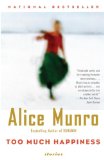Summary | Excerpt | Reading Guide | Reviews | Beyond the Book | Readalikes | Genres & Themes | Author Bio

Critics' Opinion:
Readers' Opinion:
First Published:
Nov 2009, 320 pages
Paperback:
Nov 2010, 320 pages
 Book Reviewed by:
Book Reviewed by:
Marnie Colton
Buy This Book
i
Many persons who have not studied mathematics confuse it
with arithmetic and consider it a dry and arid science.
Actually, however, this science requires great fantasy.
—Sophia Kovalevsky
On the first day of January, in the year 1891, a small woman and a large man are walking in the Old Cemetery, in Genoa. Both of them are around forty years old. The woman has a childishly large head, with a thicket of dark curls, and her expression is eager, faintly pleading. Her face has begun to look worn. The man is immense. He weighs 285 pounds, distributed over a large frame, and being Russian, he is often referred to as a bear, also as a Cossack. At present he is crouching over tombstones and writing in his notebook, collecting inscriptions and puzzling over abbreviations not immediately clear to him, though he speaks Russian, French, English, Italian and has an understanding of classical and medieval Latin. His knowledge is as expansive as his physique, and though his speciality is governmental law, he is capable of lecturing on the growth of contemporary political institutions in America, the peculiarities of society in Russia and the West, and the laws and practices of ancient empires. But he is not a pedant. He is witty and popular, at ease on various levels, and able to live a most comfortable life, due to his properties near Kharkov. He has, however, been forbidden to hold an academic post in Russia, because of being a Liberal.
His name suits him. Maksim. Maksim Maksimovich Kovalevsky.
The woman with him is also a Kovalevsky. She was married to a distant cousin of his, but is now a widow.
She speaks to him teasingly.
“You know that one of us will die,” she says. “One of us will die this year.”
Only half listening, he asks her, Why is that?
“Because we have gone walking in a graveyard on the first day of the New Year.”
“Indeed.”
“There are still a few things you don’t know,” she says in her pert but anxious way. “I knew that before I was eight years old.”
“Girls spend more time with kitchen maids and boys in the stables—I suppose that is why.”
“Boys in the stables do not hear about death?”
“Not so much. Concentration is on other things.”
There is snow that day but it is soft. They leave melted, black footprints where they’ve walked.
She met him for the first time in 1888. He had come to Stockholm to advise on the foundation of a school of social sciences. Their shared nationality, going so far as a shared family name, would have thrown them together even if there was no particular attraction. She would have had a responsibility to entertain and generally take care of a fellow Liberal, unwelcome at home.
But that turned out to be no duty at all. They flew at each other as if they had indeed been long-lost relatives. A torrent of jokes and questions followed, an immediate understanding, a rich gabble of Russian, as if the languages of Western Europe had been flimsy formal cages in which they had been too long confined, or paltry substitutes for true human speech. Their behavior, as well, soon overflowed the proprieties of Stockholm.
He stayed late at her apartment. She went alone to lunch with him at his hotel. When he hurt his leg in a mishap on the ice, she helped him with the soaking and dressing and, what was more, she told people about it. She was so sure of herself then, and especially sure of him. She wrote a description of him to a friend, borrowing from De Musset.
He is very joyful, and at the same time very gloomy—
Disagreeable neighbor, excellent comrade - Extremely light-minded, and yet very affected - Indignantly naïve, nevertheless very blasé—
Excerpted from the title story of Too Much Happiness by Alice Munro Copyright © 2009 by Alice Munro. Excerpted by permission of Knopf, a division of Random House, Inc. All rights reserved. No part of this excerpt may be reproduced or reprinted without permission in writing from the publisher.




Books are the carriers of civilization
Click Here to find out who said this, as well as discovering other famous literary quotes!
Your guide toexceptional books
BookBrowse seeks out and recommends the best in contemporary fiction and nonfiction—books that not only engage and entertain but also deepen our understanding of ourselves and the world around us.